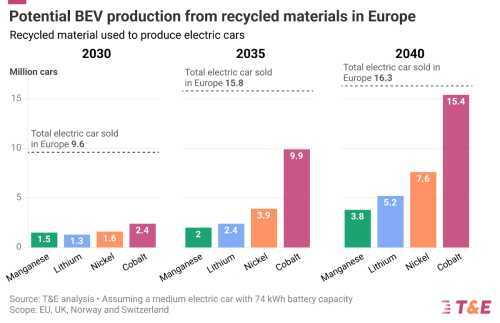Recycling could enable Europe to cut its reliance on EV battery mineral imports by up to a quarter by the end of the decade, a new study finds. Materials from end-of-life batteries and gigafactory scrap have the potential to build up to 2.4 million EVs locally in 2030, according to the research by Transport & Environment (T&E). But the EU and the UK will not be able to harness this potential unless they secure recycling projects that are at risk of being cancelled, T&E said.
Recycling spent cells and production scrap could provide 14% of the lithium, 16% of the nickel, 17% of the manganese, and a quarter (25%) of the cobalt that Europe will need for electric cars in 2030, the study finds. These could then rise significantly, and the region has the potential to be almost self-sufficient in cobalt for electric cars in 2040.
Recovering battery materials will also replace the need for primary ores. The research finds recycling EV minerals in Europe could avoid the need to build 12 new mines globally by 2040: four lithium, three nickel, four cobalt, and one manganese. This would also reduce the potential negative impacts on water, soil and biodiversity from those mines.
Read more:
https://www.greencarcongress.com/2024/12/20241216-te.html

















